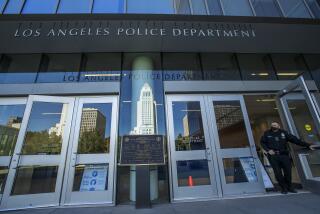Panel Backs Plan to Get More People Onto Juries
- Share via
SAN FRANCISCO — In an attempt to get more people onto juries, the state Judicial Council on Thursday endorsed proposals to provide better pay, protect juror identity and limit the ability of lawyers to prune potential panelists before trials.
The plan adopted by the council, the policymaking body for the state court system, must be approved by the Legislature before it can take effect. But Thursday’s vote is likely to carry significant weight because the measures have now been approved by the state’s top judicial body.
“Many of these are very likely to be enacted,” predicted San Diego County Superior Court Judge Judith McConnell, who served on a blue-ribbon commission that studied the jury system.
The commission was established after Gov. Pete Wilson called on the council to shake up the jury system following the O.J. Simpson verdicts. In another move spurred by the Simpson trial, the council recently decided to restrict, but not eliminate, cameras in the courtroom.
Under Thursday’s changes, jurors would be identified only by number, not by name, even to the lawyers in the case. This would make it substantially more difficult for the news media to learn the names of jurors and hinder the ability of lawyers and consultants to research jurors’ backgrounds.
Council members cited surveys that have found many people are afraid to serve in criminal cases because of reprisals. But lawyers strongly favor using names because they make it easier to learn about the prospective panelists.
To lure more people into showing up for jury service, the council voted to support using state revenues to pay jurors $40 a day for the first 30 days of service and $50 for more prolonged duty. In Los Angeles County, jurors are now paid only $5 a day.
Needy jurors would be reimbursed for child-care costs, and all of those who serve would be given free parking or public transit. Businesses also would receive tax credit for paying their employees while they serve.
For those who still decline to respond to jury notices, the Judicial Council adopted proposals to make service a mandatory duty under state law and to give the state the ability to deny drivers’ licenses to those who shirk this civic responsibility.
The most controversial proposal embraced by the council calls for reducing the number of challenges lawyers can use in criminal cases to excuse potential jurors without explanation.
In most criminal cases, both sides can remove 10 potential jurors this way. The council’s proposal would shave these “peremptory” challenges to six, and, in the most serious cases, to 12 from 20.
Those who favor limiting these challenges complain they simply diminish an already short supply of jurors and enable crafty lawyers and their consultants to try to seat panels likely to vote their way.
“The bottom line is the system doesn’t work if we don’t have enough jurors,” said Court of Appeal Justice Arthur Scotland, a council member. “We have a very significant problem with juror dissatisfaction.”
But lawyers strenuously defend their opportunities to bump potential jurors, predicting that more juries will deadlock unless biased jurors can be easily removed. Several council members contended that there was no reliable evidence to show that bumping potential jurors in this way hurts the system.
The council also voted to reduce from 12 to eight the number of jurors required to decide minor civil disputes in Municipal Court, but rejected proposals that would have reduced jury size in misdemeanor criminal cases.
Although the Legislature has been talking about such changes for years, supporters of reform contend that the Judicial Council action, combined with a growing shortage of jurors statewide, may finally propel state lawmakers into action next year.
“In the past,” said Judge McConnell, “there wasn’t really a problem getting jurors. Now there is.”
More to Read
Sign up for Essential California
The most important California stories and recommendations in your inbox every morning.
You may occasionally receive promotional content from the Los Angeles Times.














